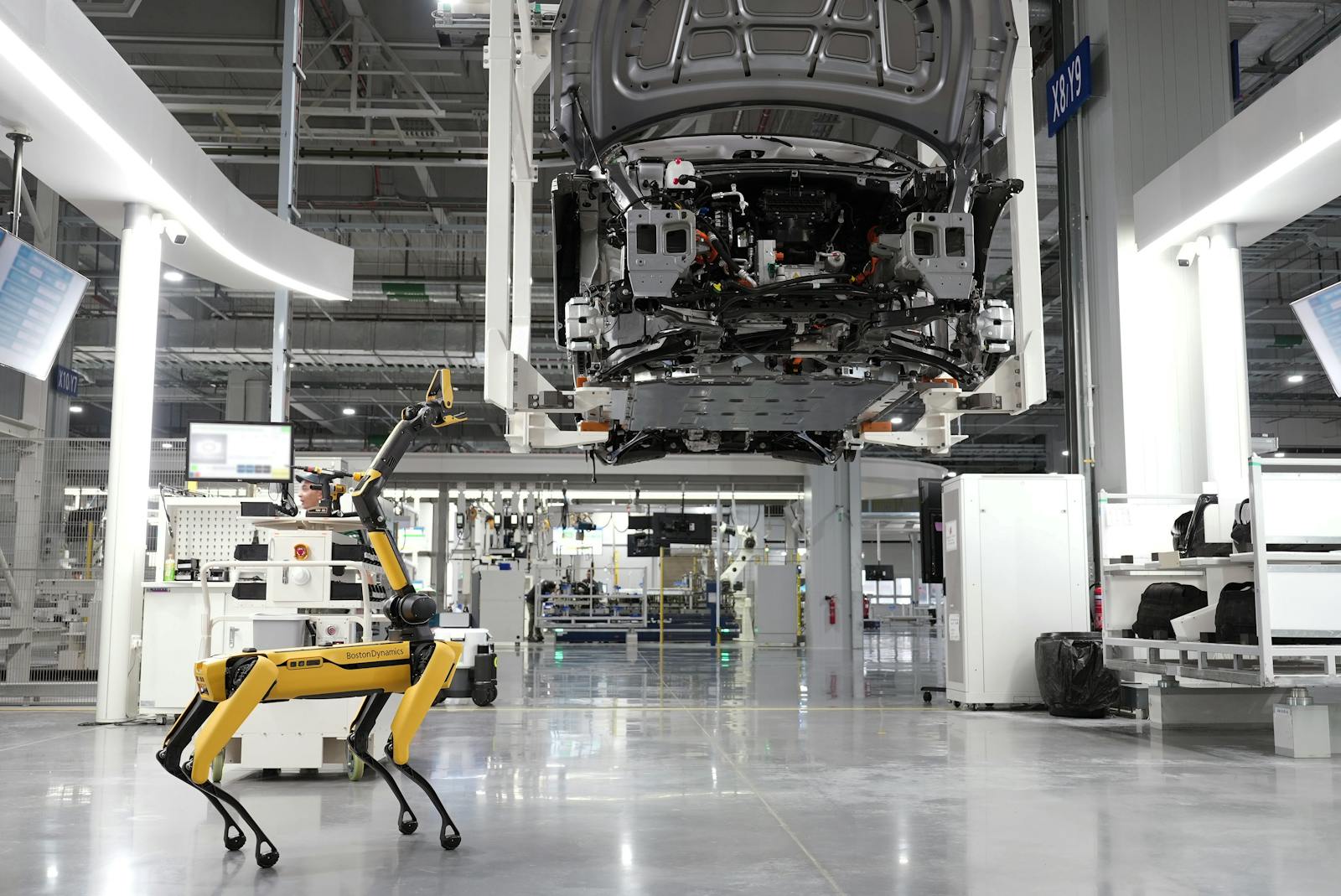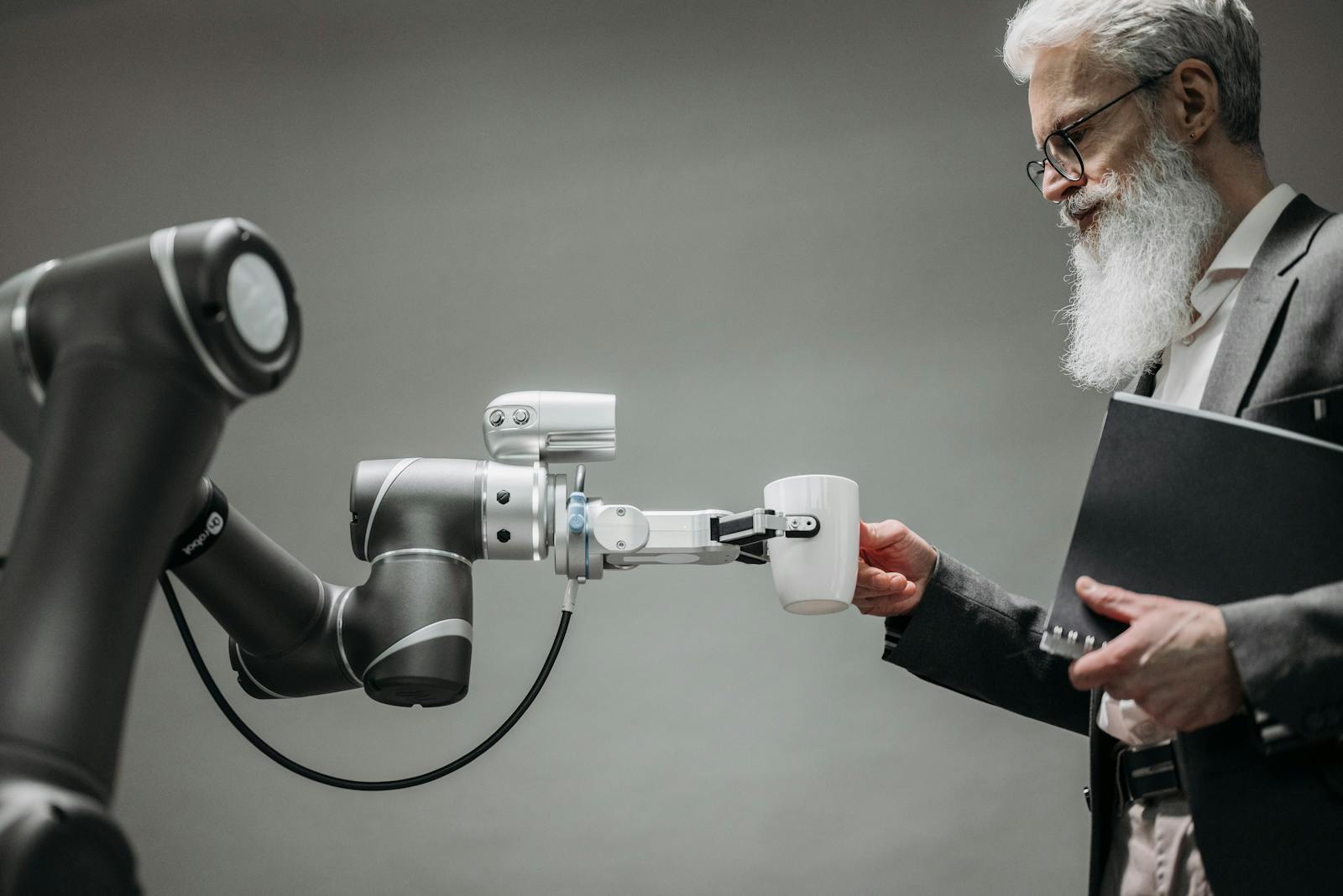Table of Contents
- AI-Driven Decision Making: The New Frontier of Business Strategy
- Personalized Customer Experiences: Tailoring Engagement with Precision
- Automation and Efficiency Gains: Streamlining Operations with Smart Tools
- Enhanced Data Analytics and Real-Time Insights: Making Sense of Big Data
- Integration with IoT and Edge Computing: Bridging the Digital and Physical Worlds
- Advancements in Natural Language Processing: Enhancing Conversational AI
- Strengthening Cybersecurity with AI: Defending Against Evolving Threats
- Hybrid Workforce: Seamless Collaboration Between Humans and AI
- Scalability and Cloud-Based AI Solutions: Powering Global Operations
- Ethical AI and Transparency: Building Trust Through Responsible Practices
- Embracing the Future with Informed Confidence
Margabagus.com – In today’s rapidly evolving digital landscape, the ways in which businesses harness technology are transforming at an unprecedented pace. As you navigate this dynamic era, you might have noticed that enterprise AI adoption trends are reshaping industries and challenging conventional business models. AI agents—once considered futuristic tools—are now a tangible asset driving decision-making, operational efficiency, and customer engagement. In this article, I share data-driven insights and practical examples that will help you, whether you’re a tech enthusiast or a business leader, understand the top trends influencing AI agent adoption in modern companies. Prepare to dive into a comprehensive discussion backed by expert analyses and real-world case studies that reveal how these trends are not only innovative but also essential for staying competitive in today’s market.
1. AI-Driven Decision Making: The New Frontier of Business Strategy

Photo by Campaign Creators on Unsplash
One of the most transformative trends reshaping corporate strategies is the rise of AI-driven decision making. In modern companies, algorithms are not only processing vast datasets faster than ever before—they’re learning and adapting to provide predictive insights that significantly enhance decision quality. According to a 2025 Gartner report, organizations that implement advanced AI systems have experienced decision cycles that are up to 25% faster than those relying solely on human intuition .
Imagine a scenario where a retail giant leverages AI to analyze seasonal buying patterns and stock inventory accordingly. This isn’t a futuristic concept but a reality where companies integrate AI into their daily operations. The implementation of AI agents in these environments goes beyond automation; it creates an intelligent feedback loop that refines strategies based on real-time data. I’ve seen companies transform their supply chains, reduce wastage, and boost profitability by simply letting AI assist with strategic decisions.
The key here is the evolution of AI agent implementation strategies. Companies are now investing in systems that continuously learn from their internal data and external market trends, making the decision-making process both agile and highly accurate. The impact is profound, as organizations not only save time but also allocate resources more efficiently—resulting in measurable improvements in performance and growth.
2. Personalized Customer Experiences: Tailoring Engagement with Precision

Photo by Habitat_de_lill on Pixabay
In the age of digital personalization, businesses are increasingly turning to AI agents to create highly customized customer experiences. Data is at the core of personalization; by analyzing consumer behavior, preferences, and past interactions, AI systems craft tailored recommendations and solutions. This trend isn’t just about marketing—it’s about fundamentally understanding your customer base.
Experts like Dr. Fei-Fei Li have highlighted the importance of data-driven personalization in enhancing customer satisfaction and loyalty. For instance, streaming services like Netflix employ sophisticated algorithms to curate content libraries based on individual viewing histories. This method of hyper-personalization is now being adopted by retail, finance, and even healthcare sectors, ensuring that every customer interaction is relevant and timely.
Furthermore, modern companies are integrating AI chatbots that not only answer queries but also learn from each interaction. This continuous learning process leads to what can be termed as modern AI agent success stories, where improved customer service directly correlates with increased sales and customer retention. The benefits are evident: reduced customer service costs, faster response times, and an overall uplift in customer experience that reinforces trust and brand loyalty.
3. Automation and Efficiency Gains: Streamlining Operations with Smart Tools

Photo by Hyundai Motor Group on Pexels
Efficiency is the cornerstone of modern business, and nothing epitomizes operational excellence more than automation powered by AI agents. Automation is no longer limited to repetitive tasks; it now encompasses complex workflows that require adaptability and precision. Recent studies, including those from McKinsey & Company, indicate that integrating AI into business processes can lead to a 40% improvement in operational efficiency .
Consider a manufacturing plant where AI agents are deployed to monitor equipment performance, predict failures, and schedule maintenance autonomously. This proactive approach not only minimizes downtime but also extends the lifecycle of expensive machinery. I’ve observed firsthand how even small to mid-sized companies are leveraging automation to streamline supply chains, manage inventories, and even optimize marketing campaigns—all with minimal human intervention.
The beauty of this trend lies in its scalability. Whether you run a startup or a multinational corporation, automating processes through AI agents can free up your human talent to focus on innovation and creative problem-solving. Embracing automation is not just about cutting costs—it’s about rethinking how you allocate resources and build a resilient, future-ready organization.
4. Enhanced Data Analytics and Real-Time Insights: Making Sense of Big Data

Photo by Luke Chesser on Unsplash
The explosion of big data has created a demand for sophisticated analytical tools that can interpret information in real time. AI agents are now at the forefront of this revolution, enabling companies to derive actionable insights from massive datasets almost instantaneously. Real-time analytics allow businesses to respond to market changes swiftly, improving agility and competitiveness.
For example, an e-commerce giant implemented an AI-powered analytics platform that processed millions of customer interactions daily. This system not only provided insights into consumer behavior but also identified emerging trends before they became apparent through traditional analysis methods. As a result, the company was able to adjust its marketing strategies in near real-time, boosting sales during peak seasons and optimizing inventory management.
The integration of advanced data analytics has also paved the way for predictive modeling. By forecasting future trends and customer behaviors, AI agents empower companies to make proactive decisions rather than reactive adjustments. Such capabilities are essential in today’s fast-paced environment where timely decision making can make all the difference. This is a clear example of how AI agent implementation strategies are evolving, ensuring that data isn’t just stored but actively used to drive success.
5. Integration with IoT and Edge Computing: Bridging the Digital and Physical Worlds

Photo by TheDigitalArtist on Pixabay
As businesses continue to digitize their operations, the convergence of AI with the Internet of Things (IoT) and edge computing is becoming increasingly critical. This trend is redefining how companies collect, process, and utilize data. By deploying AI agents at the edge of networks—closer to data sources—organizations can achieve unprecedented levels of efficiency and responsiveness.
Take the example of smart factories, where IoT sensors collect data on everything from machine performance to environmental conditions. AI agents analyze this data in real time, predicting maintenance needs and optimizing production processes. This not only reduces operational costs but also minimizes the risk of unexpected downtime. The integration of IoT and edge computing represents a pivotal shift, allowing businesses to operate more like agile ecosystems rather than rigid hierarchies.
Moreover, this trend is a testament to how companies are evolving their modern AI agent success stories. By ensuring that data processing happens locally rather than being sent back to a centralized cloud, these systems reduce latency and improve real-time decision making—a critical factor in industries where every millisecond counts. As IoT devices proliferate and edge computing becomes more accessible, the potential for innovation in this space is virtually limitless.
6. Advancements in Natural Language Processing: Enhancing Conversational AI
Natural Language Processing (NLP) has long been a cornerstone of AI research, and recent advancements are taking this technology to new heights. AI agents are now equipped with the ability to understand, interpret, and generate human language with remarkable accuracy. This progress is reshaping how businesses interact with their customers and streamline internal communications.
Modern NLP algorithms are more nuanced, allowing AI agents to comprehend context, sentiment, and even cultural subtleties. Voice assistants such as Siri, Alexa, and Google Assistant are familiar examples, but the applications extend far beyond consumer gadgets. In the corporate world, AI-powered chatbots and virtual assistants are handling customer queries, managing appointments, and even facilitating internal communications with a level of sophistication that was unimaginable just a few years ago.
One striking example comes from a financial services firm that integrated an AI-driven conversational platform. The system not only managed client inquiries but also learned from every interaction, continuously improving its performance. This initiative, part of a broader AI agent implementation strategies plan, resulted in a 50% reduction in response times and a significant boost in customer satisfaction. The progress in NLP is not just a technological milestone—it’s a vital component of the modern digital transformation journey.
7. Strengthening Cybersecurity with AI: Defending Against Evolving Threats
Cybersecurity remains one of the most critical concerns for modern businesses, and AI agents are stepping up as key defenders in this space. With cyber threats evolving rapidly, traditional security measures often fall short. AI, with its capacity for real-time threat detection and rapid response, offers a powerful solution.
Recent reports from IBM Security and other authoritative bodies have shown that AI-enhanced cybersecurity systems can detect anomalies and potential breaches significantly faster than conventional methods . For instance, an AI-based system implemented by a multinational bank was able to identify and neutralize a sophisticated phishing attack within minutes, preventing what could have been a catastrophic breach.
This proactive approach not only saves money but also protects the trust that customers place in a brand. When cyberattacks occur, the fallout isn’t just financial; it also damages a company’s reputation. By employing AI agents for cybersecurity, businesses demonstrate a commitment to protecting both their assets and the sensitive data of their customers. This trustworthiness is crucial, especially in sectors like finance and healthcare, where the stakes are incredibly high.
8. Hybrid Workforce: Seamless Collaboration Between Humans and AI

Photo by Pavel Danilyuk on Pexels
The future of work is not about replacing humans with machines—it’s about creating a hybrid workforce where AI agents and human employees collaborate seamlessly. This trend is redefining job roles, streamlining processes, and fostering a culture of innovation. The integration of AI into the workplace means that routine tasks are automated, allowing human talent to focus on strategic and creative endeavors.
In practical terms, this trend is evident in industries ranging from healthcare to logistics. For example, in a customer service center, AI agents handle standard inquiries while human operators focus on more complex cases that require empathy and critical thinking. This collaboration not only increases efficiency but also enhances the quality of service provided. In my experience, companies that have embraced a hybrid model report higher employee satisfaction and improved overall performance.
A significant advantage of this approach is that it nurtures innovation. AI agents take over monotonous tasks, freeing up human employees to engage in problem solving and creative initiatives. This synergy is one of the key pillars behind modern AI agent success stories in today’s business world. The result is a workforce that is both technologically empowered and human-centric—a winning formula for long-term success.
9. Scalability and Cloud-Based AI Solutions: Powering Global Operations
As businesses expand their digital capabilities, scalability becomes a crucial factor in sustaining growth. Cloud-based AI solutions are at the heart of this trend, enabling companies to scale their operations quickly and efficiently. Major players like AWS, Microsoft Azure, and Google Cloud have developed platforms that not only support AI deployments but also provide the infrastructure needed for rapid scaling.
Recent surveys indicate that over 70% of enterprises in 2025 are transitioning to cloud-based AI infrastructures to manage large-scale operations and global data flows . These solutions offer flexibility, security, and cost-effectiveness—features that are indispensable for businesses operating in a global marketplace. By moving their AI initiatives to the cloud, companies can deploy updates seamlessly, integrate new features without significant downtime, and manage data more effectively across distributed environments.
Moreover, cloud-based platforms facilitate collaborative innovation. Teams across different geographic locations can work together in real time, using AI tools to analyze data, share insights, and refine strategies. This collaborative environment is a cornerstone of AI agent implementation strategies that are designed to harness the full potential of cloud computing. The result is a robust, agile, and scalable system that empowers companies to meet the demands of an ever-changing digital landscape.
10. Ethical AI and Transparency: Building Trust Through Responsible Practices

Photo by tungnguyen0905 on Pixabay
With great power comes great responsibility. As AI agents become integral to business operations, ensuring ethical practices and transparency in their deployment is paramount. Modern companies recognize that the credibility of their AI systems hinges on ethical guidelines and clear, transparent implementation strategies.
Issues such as data privacy, algorithmic bias, and accountability are at the forefront of discussions among thought leaders and policymakers. Institutions like the MIT Media Lab and organizations such as the Partnership on AI are leading the charge in establishing ethical frameworks that govern AI development and usage. These guidelines not only mitigate risks but also build trust with customers and stakeholders—an essential factor in long-term success.
In practical terms, this trend involves creating systems that are auditable and explainable. For example, a leading technology firm recently launched an initiative to ensure that its AI agents are fully transparent in their decision-making processes. By providing detailed reports on how decisions are made and incorporating feedback loops, the company has set a benchmark for ethical AI use in the industry. This emphasis on transparency is a critical aspect of building modern AI agent success stories and aligns with the broader trend of responsible technology adoption.
Embracing the Future with Informed Confidence
Reflecting on these top 10 trends, it becomes evident that the adoption of AI agents in modern companies is not just a fleeting phenomenon—it’s a fundamental shift in how businesses operate and innovate. From accelerating decision-making and personalizing customer experiences to strengthening cybersecurity and ensuring ethical practices, each trend underscores the transformative power of AI.
I encourage you to examine these trends in the context of your own business. Whether you’re considering AI agent implementation strategies to streamline operations or looking to tap into the latest tech trends to gain a competitive edge, the insights provided here are designed to help you make informed, strategic decisions. The landscape of modern business is evolving rapidly, and staying ahead means embracing innovation with both enthusiasm and caution.
The journey toward effective AI integration is complex and multifaceted, yet it holds enormous potential for those willing to invest in its possibilities. As you digest these insights, remember that the future of work is a collaborative one—where humans and AI agents work side by side to unlock new avenues for growth and efficiency. By staying informed and proactive, Anda can leverage these advancements to build a resilient, future-ready organization that thrives in the digital age.
In closing, I hope this article has provided you with a clear, fact-based roadmap to navigate the exciting realm of AI agent adoption. The evidence is compelling, and the opportunities are boundless. Embrace the journey, explore innovative strategies, and stay tuned to emerging trends. Together, we can redefine what it means to succeed in the modern business world.






